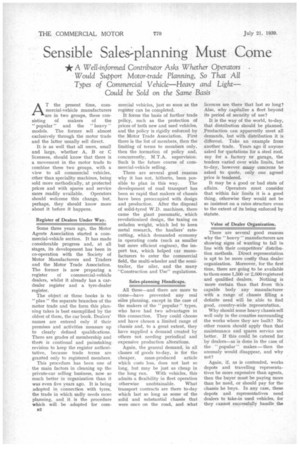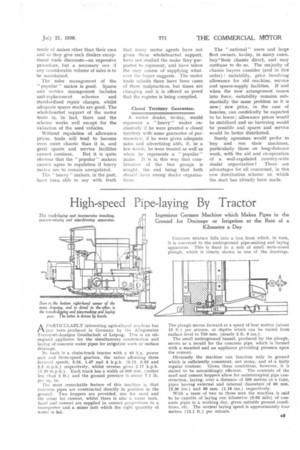Sensible Sales-planning Must Come
Page 36

Page 37

If you've noticed an error in this article please click here to report it so we can fix it.
* A Well-informed Contributor Asks Whether Operators . Would Support Motor-trade Planning, So That All Types of Commercial Vehicle—Heavy and Light— Could be Sold on the Same Basis AT the present time, commercial-vehicle manufacturers are in two groups, these consisting of makers of the " popular " and the "heavy " models. The former sell almost exclusively through the motor trade and the latter usually sell direct.
It is as well that all users, small and large, whether A, B or C licensees, should know that there is a movement in the motor trade to combine these two groups, with a view to all commercial vehicles, other than speciality machines, being sold more methodically, at protected prices and with spares and service more readily available. Operators should welcome this change, but, perhaps, they should know more about it before it happens.
Register of Dealers Under Way.
Some three years ago, the Motor Agents Association started a commercial-vehicle section. It has made considerable progress and, at all stages, its development has been in co-operation with the Society of Motor Manufacturers and Traders and the Motor Trade Association. The former is now preparing a register of commercial-vehicle dealers, whilst it already has a cardealer register and a tyre-dealer register.
The object ot these books is to " plan " the separate branches of the motor trade and the form this planning takes is best exemplified by the oldest of them, the car book. Dealers' names are entered only if their premises and activities measure up to clearly defined qualifications. There are grades of membership and there is continual and painstaking revision to keep the register authoritative, because trade terms are granted only to registered members.
This procedure has been one of the main factors in cleaning up the private-car selling business, now so much better in organization than it was even five years ago. It is being adopted in connection with tyres, the trade in which sadly needs more planning, and it is the procedure which will be adopted for corn B2 mercial vehicles, just so soon as the register can be completed.
It forms the basis of further trade policy, such as the protection of prices of both new and used vehicles, and the policy is rigidly enforced by the Motor Trade Association. First there is the list of members, then the limiting of terms to members only, then the formation of policy and. concurrently, M.T.A. supervision. Such is the future course of commercial-vehicle selling.
There are several good reasons why it has not, hitherto, been pos sible to plan in this way. The development of road transport has been so rapid that makers of chassis have been preoccupied with design and production. After the disposal of solid-tyred W.D. machines, there came the giant pneumatic, which revolutionized design, the taxing on unladen weight, which led to keen metal research, the hauliers' ratecutting, which demanded economy in operating costs (such as smaller but more efficient engines), the import tax, which helped car manufacturers to enter the commercial field, the multi-wheeler and the semitrailer, the oiler, and the many "Construction and Use" regulations.
Sales-planning Handicaps.
All these—and there are more to come—have prevented any real sales planning, except in the case of the makers of the " popular " types, who have had two advantages in this connection. They could choose and have chosen a limited range of chassis and, to a great extent, they have supplied a demand created by others not, needing periodical and expensive production alterations.
Again, the general demand, in all classes of goods to-day, is for the cheaper, mass-produced article which costs less, does not last so long, but may be just as cheap in the long run. With vehicles, this admits a flexibility in fleet operation otherwise unobtainable. What transport contracts are there to-day which last so long as some of the solid and substantial chassis that were once on the road, and what licences are there that last so long? Also, why capitalize a fleet beyond its period of security of use?
It is the way of the world, to-day, that distribution should be planned. Production can apparently meet all demands, but with distribution it is different. Take an example from another trade. Years ago if anyone asked for quotations for a steel roof, say for a factory ior garage, the tenders varied over wide limits, but to-day, however many concerns be asked to quote, only one agreed price is tendered. •
It may be a good or bad state of affairs. Operators must consider that within fair limits it is a good thing, otherwise they would not be so insistent on a rates structure even to the extent of its being enforced by statute.
Value of Dealer Organization.
There are several good reasons why the " heavy " manufacturers are showing signs of wanting to fall in line with their competitors' distribution methods. Direct representation is apt to be more costly than dealer organization. Moreover, for the first time, there are going to be available to them some 1,500 or 2,000 registered and qualified dealers. Nothing is more certain than that from this capable body any manufacturer with a range of chassis filling a definite need will be able to find good, country-wide representation.
Why should some heavy chassis sell well only in the counties surrounding the works where they are built? No other reason should apply than that maintenance and spares service are better. If this could be catered for by dealers—as is done in the case of the " popular" makes—then the anomaly would disappear, and why not?
Again, if, as is contended, works depots and travelling representatives be more expensive than agents, then the buyer must be paying more than he need, or should pay for the chassis he buys. In any case, these depots and representatives need dealers to take-in used vehicles, for they cannot successfully handle the resale of makes other than their own and so they give such dealers exceptional trade discounts—an expensive procedure, but a necessary one if any considerable volume of sales is to be maintained.
The sales management of the "popular" makes is good. Spares and service management includes unit-replacement schemes and standardized repair charges, whilst adequate spares stocks are good. The wholehearted support of the motor trade is, in fact, there and the scheme works well except for the valuation of the used vehicles.
Without regulation of allowance prices, trade will tend to become even more chaotic than it is, and good spares and service facilities cannot continue. But it is quite obvious that the "popular" makers cannot agree to regulation if heavy makes are to remain unregulated.
The " heavy" makers, in the past, have been able to say with truth that many motor agents have not given them wholehearted support, have not studied the make theypurported to represent, and have taken the easy course of supplying whatever the buyer suggests. The motor trade admits there have been cases of these malpractices, but times are changing and it is offered as proof that the register is being compiled.
Closed Territory Guarantee.
A motor dealer, to-day, would represent a "heavy" maker exclusively if he were granted a closed territory with some guarantee of permanency, if he were given adequate sales and advertising aids, if, in a few words, he were treated as well as when he represents a " popular " make. It is in this way that combination of the two groups is sought, the end being that both should have strong dealer organizations.
The " national " users and large fleet owners, to-day, in many cases, buystheir chassis direct, and may continue to do so. The majority of chassis buyers consider (and in this order) : suitability, price involving allowance for old machine, service and spares-supply facilities. If and when the new arrangement comes into force, suitability remains substantially the same problem as it is now ; new price, in the case of heavies, can confidently be expected to be lower ; allowance prices would be stabilized and no bartering would be possible and spares and service would be better distributed.
Surely operators would prefer to buy and rim their machines, particularly those on long-distance work, with the aid and co-operation of a well-regulated country-wide dealer organization? There are advantages for all concerned, in this new distribution scheme on which the start has already been made.












































































